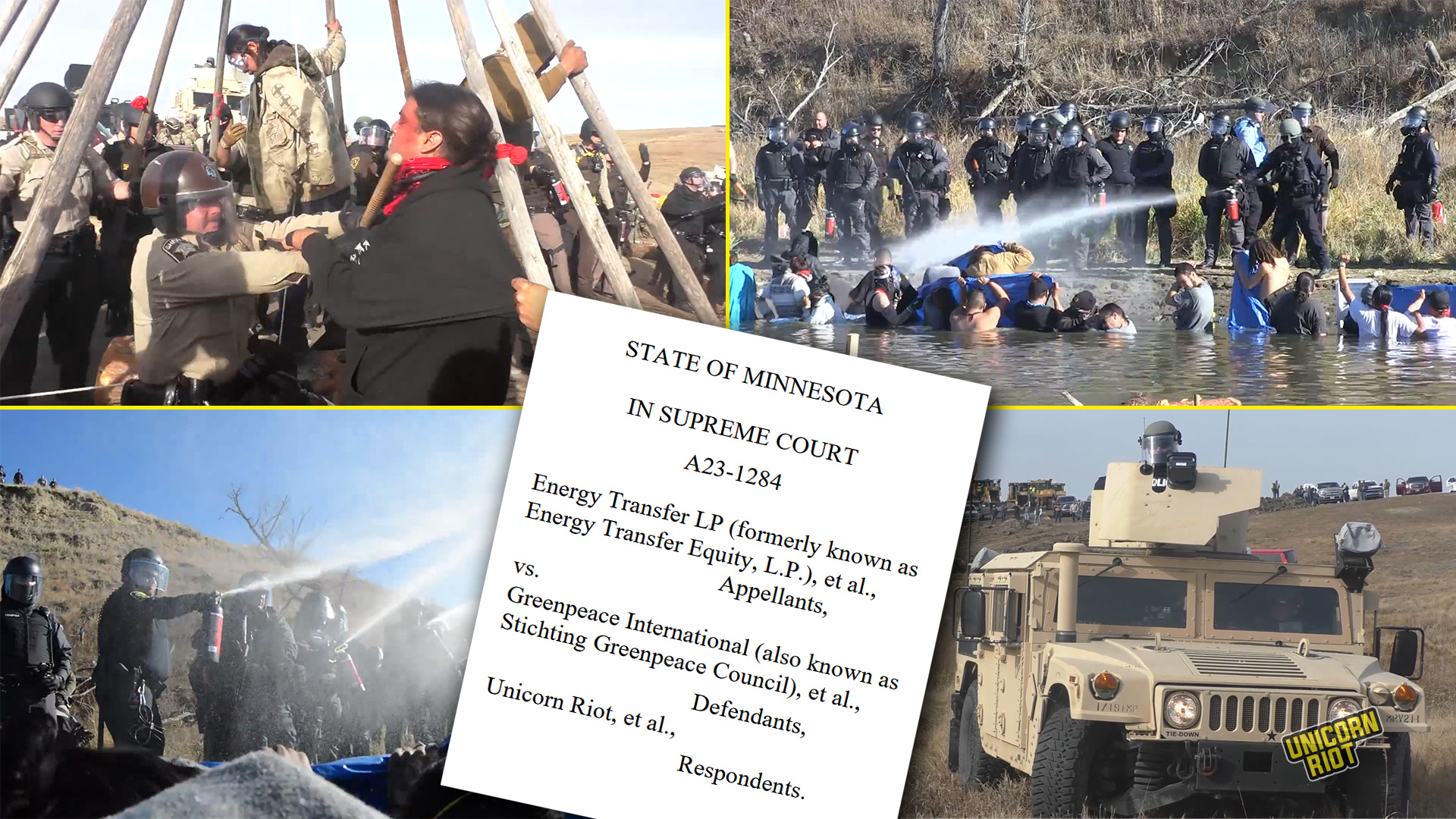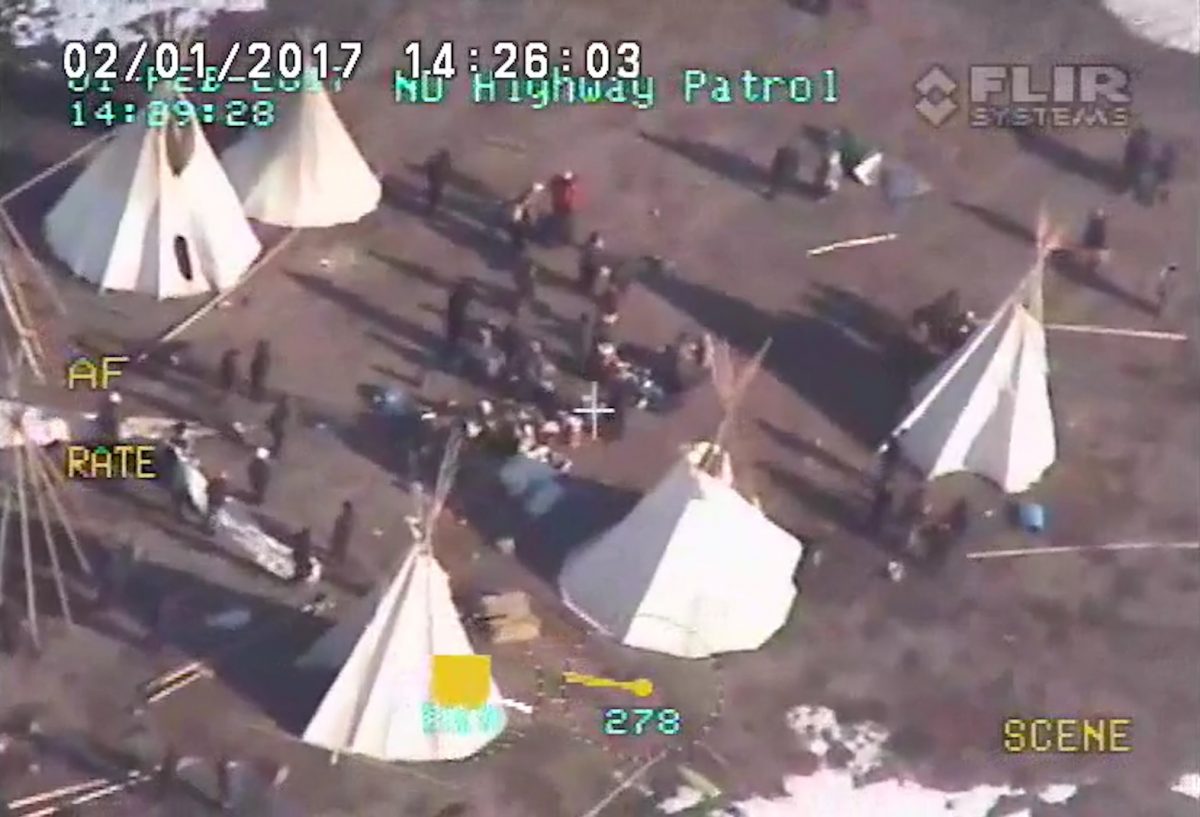Minnesota Supreme Court Rules on Unicorn Riot DAPL Subpoena
St Paul, MN — Unicorn Riot’s long legal battle in Minnesota to protect newsgathering materials from attorneys working for Energy Transfer reached yet another phase: The Minnesota Supreme Court released its ruling Wednesday about the subpoena in Hennepin County that has attempted to probe our organization. The court rejected Energy Transfer’s attempt to compel the release of newsgathering materials and reporter communications; it also ruled that a judge could order a complex document called a privilege log to be created.
On the road leading to Minnesota’s highest court, the case was briefed and argued by a team last December, including attorneys from the Minnesota Civil Liberties Union and the national American Civil Liberties Union State Supreme Court Initiative, with the help of appellate expert Ryan Simatic.
“The Minnesota Supreme Court made the right call: Those who seek to pry sensitive information away from newsgatherers cannot defeat the robust protections of the MFFIA [Minnesota Free Flow of Information Act] simply by alleging that the newsgatherers trespassed or jaywalked in pursuit of a story,” said Matthew Segal, co-director of the ACLU State Supreme Court Initiative, in a statement. “A free press demands that we protect journalists from attempts to misuse the law to strongarm them into compliance.”
In April 2021, the company behind the Dakota Access Pipeline started trying to force Unicorn Riot to hand over sensitive and privileged materials developed in the process of covering the controversial fracked oil pipeline and the massive, historic Indigenous-led resistance against it. (See our full-length documentary, Black Snake Killaz [2017], DAPL category, and Standing Rock and DAPL content archives for dozens of original stories.)
We are grateful that we could provide coverage from Standing Rock territory, where thousands of people mobilized in a huge movement against the construction of the Dakota Access Pipeline. The Cheyenne River Sioux Tribe was also opposed to the pipeline due to its direct impact on the waters of Lake Oahe, on which they rely for spiritual practices and ceremonies. The pipeline endangers the health of Indigenous people and others downstream to this day, particularly members of the Standing Rock Sioux Tribe, who firmly opposed the pipeline project for years. It leaked five times in just its first half year of operation — part of an enormous spray of leaks from Energy Transfer’s poorly designed infrastructure.
Repression of Indigenous people is often a forerunner to expanded future campaigns. Much like today’s federalized National Guard operations against protests in California, the North Dakota National Guard took control of the protested pipeline construction area. The campaign to crush these protests included advanced tactics by private players, including an “Information War” by the National Sheriffs Association, and espionage by security firm Tigerswan in a “counterinsurgency” campaign. The FBI sent informants, and Customs and Border Protection deployed a Reaper drone for 281 hours over six months, similar to tactics recently seen against protests in Los Angeles.
Thanks to the nearly a thousand supporters who donated to our Legal Defense Fund we have been able to hang tough to protect our journalism from the multi-billion dollar oil company’s litigation campaign up to this point.
In December 2022, Hennepin County District Court Judge Joseph Klein ruled Unicorn Riot should produce a log of all privileged documents and answers. We appealed this privilege log ruling, while the DAPL attorneys appealed Klein’s finding that the MFFIA applied to our nonprofit media organization.
More than a year ago, in May 2024, Unicorn Riot won a strong ruling from the Minnesota Court of Appeals, rejecting the oil company Energy Transfer LP’s attempt to obtain newsgathering materials through a subpoena — the court affirmed that the Watergate era MFFIA “applies despite alleged unlawful conduct, exceptions must apply before district courts can order privilege logs from third parties.” The Minnesota Supreme Court decided to accept another appeal from Energy Transfer, which was argued in St. Paul in December 2024.
The ACLU added, “The court ruled today that the law does not contain an exception for journalists who are alleged to have engaged in illegal activity, but it did not categorically bar trial courts from ordering journalists to produce privilege logs in response to document requests – with notable caveats.”
The court recognized Unicorn Riot’s newsgathering activities were privileged under the MFFIA:
“We hold that the plain language of the MFFIA protects Unicorn Riot’s newsgathering activities during the Standing Rock Protests. Nothing in the statutory text leads us to believe that the privileged information that Unicorn Riot collected during the Standing Rock Protests should be excepted from the prohibition on disclosure under the MFFIA.”
Minnesota Supreme Court ruling in case A23-1284. (Energy Transfer LP (formerly known as Energy Transfer Equity, L.P.), et al., Appellants, vs. Greenpeace International (also known as Stichting Greenpeace Council), et al., Defendants, Unicorn Riot, et al., Respondents.)
“The Court’s decision is a welcome reminder that we value independent journalism in Minnesota,” said Teresa Nelson, legal director of the ACLU-MN, in a statement. “This win is particularly important as large corporations increasingly attempt to intimidate reporters through litigation and in the face of unprecedented attacks on the freedom of the press by the Trump administration and other government officials.”
The court gave some new direction to judges in Minnesota about privilege logs, a part of the discovery process that a lawyer called “time-consuming, tedious, onerous, beastly.”
“We find nothing in the text of the MFFIA that would prevent the district court from ordering production of a privilege log. With respect to many of Energy Transfer’s requests, we agree with the court of appeals that it is difficult to see how Unicorn Riot could produce a privilege log that would allow Energy Transfer to contest the validity of the privilege claims without identifying any privileged information. But we disagree with the court of appeals’ conclusion that the district court may never order a privilege log when a party claims privilege under the MFFIA. Producing a privilege log should not require a party to disclose privileged information in the log itself. And the MFFIA clearly protects parties from having to disclose privileged information to the district court. […] And district courts should be skeptical when reviewing a party’s request for information when the opponent claims privilege under the MFFIA, particularly when a party requests a vast amount of information that is very clearly privileged, as Energy Transfer did here.”
Minnesota Supreme Court ruling in case A23-1284.
In March 2025, in the parent case, Energy Transfer LP v. Greenpeace International, a local North Dakota jury found Greenpeace liable for $667 million in damages, which the environmental NGO is appealing.
Back in 2021, Alleen Brown and Sam Richards at The Intercept described Energy Transfer’s legal project as a “series of expensive conspiracy lawsuits against a disparate range of actors, [through which] the pipeline company has sought to paint the Standing Rock movement as the product of a vast misinformation-driven conspiracy to damage Energy Transfer.”
Trevor Timm at the Freedom of the Press Foundation described the subpoena as “a menacing attempt to intimidate a news outlet whose only ‘crime’ is being critical of the company,” — adding, “It should be thrown out immediately.”
We are also thankful for the support of many media industry and press freedom supporters, including the Reporters Committee for Freedom of the Press, and early coverage of our case by The Intercept. Tony Webster played a key role in supporting the entry of amicus briefs into our appeal; The Forum for Constitutional Rights also filed to support our position.
We are very thankful for the skills and persistence of our attorneys over the years fighting this case, including Chris Prozcko, Ryan Simatic, Teresa Nelson, Alicia Granse, Matthew Segal, and others who chipped in hours of research. We are also thankful for our current and former members who reported these stories from the front lines, sometimes injured and arrested, in cases that tested the boundaries of the First Amendment.
Legal Documents
2024-2025 Minnesota Supreme Court case:
- Energy Transfer LP v. Unicorn Riot: Respondents’ Brief (Oct. 21, 2024)
- ACLU Press release (July 16, 2025)
- Minnesota Supreme Court ruling (July 16, 2025)
Download the May 6 Minnesota Court of Appeals ruling here (PDF). Read the Amicus Briefs filed on Unicorn Riot’s behalf below:
- Forum for Constitutional Rights Amicus Brief (Nov. 6, 2023)
- Reporters Committee for a Free Press with Minnesota Newspaper Association (MNA), Silha Center for the Study of Media Ethics and Law, St. Paul Pioneer Press, Sahan Journal, American Civil Liberties Union of Minnesota (ACLU-MN), E.W. Scripps Company Amicus Brief (Nov. 3, 2023)
- Tony Webster Amicus Brief (Nov 3, 2023)
- “Court Holds Information, Like Unicorns, Should Be Free: Unicorn Riot and the Minnesota Shield Law” By Christopher Proczko (June 2024 – Media Law Letter)
Read other court documents below:
- Read the original subpoenas against Unicorn Riot (and Niko Georgiades, Unicorn Riot journalist) (Mar. 17, 2022)
- Energy Transfer filed a Motion to Compel UR and Georgiades to Comply with Subpoenas Duces Tecum (June 24, 2022)
- Read Unicorn Riot’s Memorandum in Opposition to Compel Compliance (Sept. 7, 2022)
- Energy Transfer filed another brief arguing to enforce the subpoena (Sept. 14, 2022)
- Judge Klein denied Energy Transfer’s motion to compel UR to comply with their third-party subpoenas, but the court ordered UR to produce privilege logs. You can read the ruling in full here. (Dec. 16, 2022)
- Three months after a March 31, 2023 court hearing, Judge Klein denied UR’s Motion for Relief (June 29, 2023)
- Read Unicorn Riot’s appeal here (Oct. 27, 2023)
- Read Energy Transfer’s appeal here (Sept. 27, 2023)
- Energy Transfer filed Appellants – Cross-Respondents Response and Reply Brief (Nov. 27, 2023)
- Unicorn Riot’s Respondents_Cross-Appellants’ Reply Brief (Dec. 11, 2023)
Follow us on X (aka Twitter), Facebook, YouTube, Vimeo, Instagram, Mastodon, Threads, BlueSky and Patreon.



